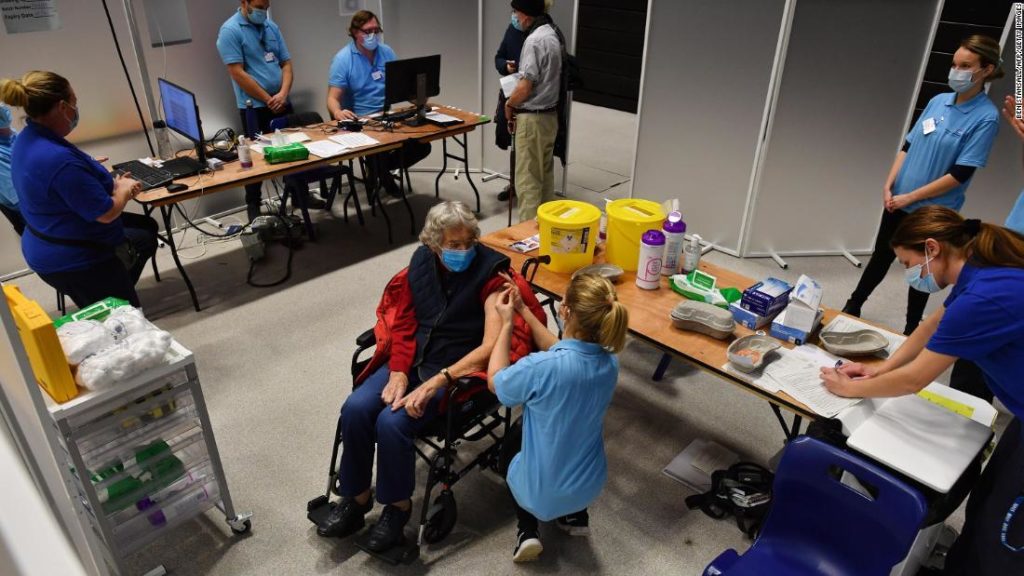The mutation, called E484K, was already part of the genetic signature of variants linked to South Africa and Brazil.
According to the PHE report, the mutation has been newly detected in at least 11 samples of the UK’s B.1.1.7 strain. It also appears some of these samples may have acquired this mutation independently, instead of spreading from a single case.
This could mean a variant already known to be more transmissible also risks becoming somewhat resistant to the immune protection offered by vaccines, or more likely to cause reinfection among people who were previously infected, experts say.
“This doesn’t appear to be great news for vaccine efficacy,” said Joseph Fauver, associate research scientist in epidemiology at the Yale School of Public Health.
He added the new finding is also something to keep monitoring in the US, where efforts to look for variants through genetic sequencing have lagged behind the UK. The fact that we’ve only seen this in the UK “may be a result of their robust genomic surveillance program,” Fauver said.
Evidence of immune escape
Experts say it’s too early to predict whether this development will greatly impact the trajectory of Covid-19 in the UK and around the world.
However, there is some research suggesting that E484K may be a key culprit behind why certain vaccines appear less effective in South Africa.
Novavax recently announced its vaccine was 89% effective in its Phase 3 UK trial, but only appeared 60% effective in a separate Phase 2b study conducted in South Africa. Similarly, in Johnson & Johnson’s Phase 3 trial, efficacy differed by country: 72% in the US versus 57% in South Africa. In both trials, 90 to 95% of cases in South Africa were linked to the B.1.351 variant, which contains the E484K mutation.
But much of the early evidence on this so-called “escape mutant” comes from research in the lab, showing that antibodies appear less able to bind spike proteins arising from the mutation.
Adding the E484K mutation appeared to raise the bar for the level of antibodies needed to prevent the lab-made virus from infecting cells, when compared to B.1.1.7 mutations on their own.
The study sampled blood from 23 people who had received a single dose of the Pfizer/BioNTech vaccine three weeks prior, with a median age of 82. The study was not able to demonstrate how this impacted people’s actual likelihood of becoming infected with virus variants.
Citing the genomics database GISAID, the study also tallied a slightly higher total of cases than the PHE report: two unrelated cases in Wales and a cluster of more than a dozen in England, appearing as early as the first half of December 2020.
Vaccines more important than ever
Paul Bieniasz, a virologist at the Rockefeller University, noted that the E484K mutation has “appeared sporadically” in multiple samples for months, but until recently it didn’t appear to offer the virus an advantage in populations with no preexisting immunity.
But it’s a different story in places like South Africa, where many people had been previously infected. On Monday, Dr. Anthony Fauci noted “a very high rate of reinfection to the point where previous infection does not seem to protect you,” citing the work of colleagues in South Africa.
The B.1.1.7 strain first spotted in the UK has now been found in at least 70 countries worldwide, including about 470 known cases in the US, according to the US Centers for Disease Control and Prevention.
Experts say that aggressive testing, adhering to Covid-19 guidelines and rapidly rolling out vaccines are more important than ever in light of these spreading variants.
“We need to get as many people vaccinated as quickly as we possibly can,” Fauci previously said. “Even though there is a diminished protection against the variants, there’s enough protection to prevent you from getting serious disease, including hospitalization and deaths.”
CNN’s Nina Avramova contributed to this report.
You may also like
-
UK coronavirus variant has been reported in 86 countries, WHO says
-
NASA technology can help save whale sharks says Australian marine biologist and ECOCEAN founder, Brad Norman
-
California Twentynine Palms: Explosives are missing from the nation’s largest Marine Corps base and an investigation is underway
-
Trump unhappy with his impeachment attorney’s performance, sources say
-
Lunar New Year 2021: Ushering in the Year of the Ox

